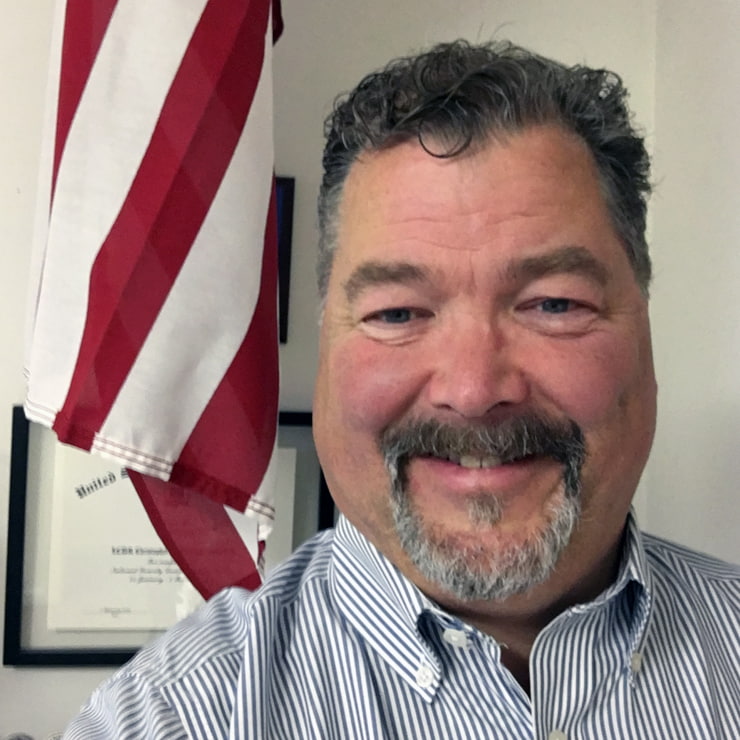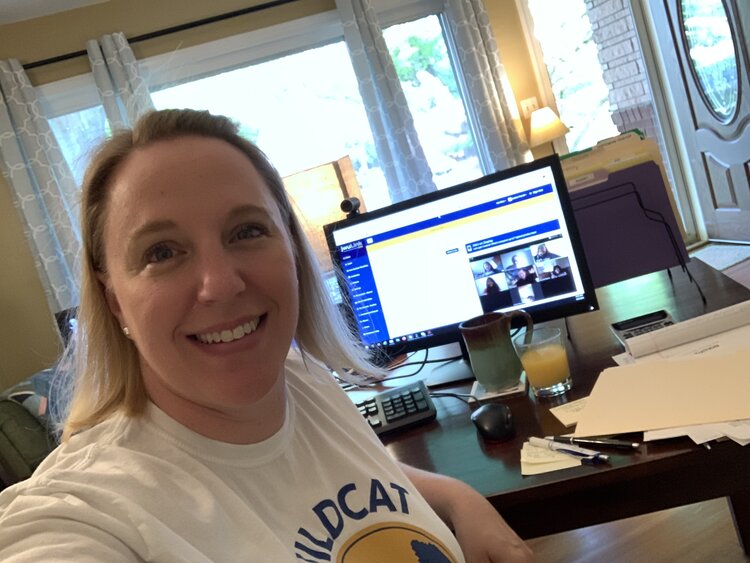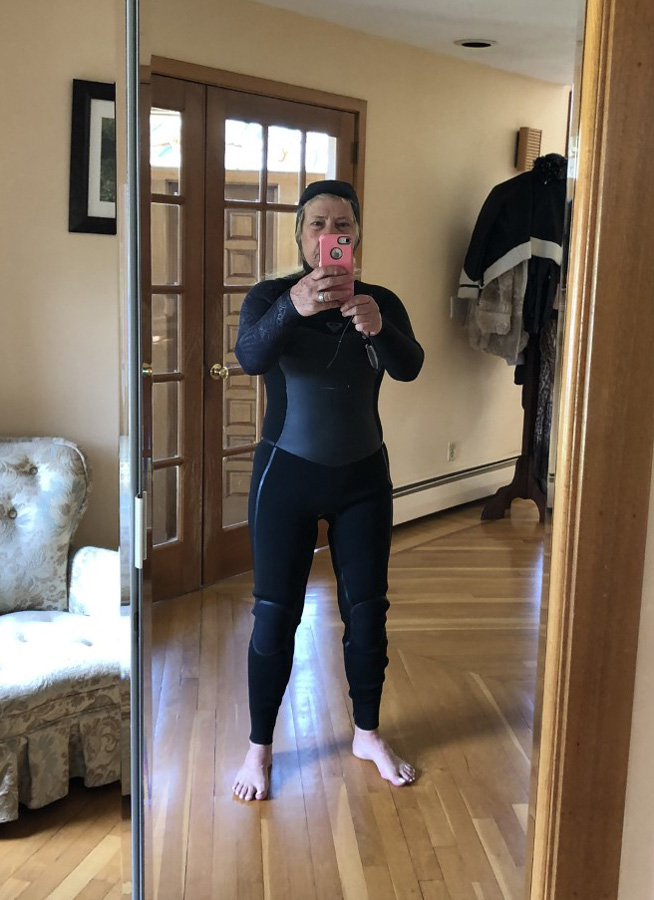In This Together
Oct 31, 2020 10:00 AM
For certain Johnson & Wales employees, working remotely after coronavirus restrictions were in place was not an option. You might call them the unsung heroes — the janitors, carpenters and other facility workers who scrubbed germs into oblivion, built plexiglass barriers, assembled hand-sanitizer dispensers, deep-cleaned the residence halls and myriad other endeavors.
Led by Jason Witham, the executive director of facilities, design & construction, the crew had support from an optimist who recognized their sacrifices. “We are a maintenance-driven department but our goal has shifted — now the top priority is keeping the environment safe,” says Witham. “I’m proud of our whole facilities team for keeping a positive attitude about the situation.”
As guidelines from the Centers for Disease Control (CDC) and state health departments shape-shifted with new discoveries, Witham was charged with implementing changes that met those mandates (which can vary depending on the state), and he oversees facilities for all four JWU campuses. “There’s been a great amount of collaboration and some excellent discussions about how to approach an issue,” he says. “It’s about striking a balance in considering the science and what’s reasonable in terms of cost and expectations around behavior.”
Granted, Witham’s powers are limited — success depends on the community wearing masks, practicing handwashing hygiene and respecting social distancing guidelines. Happily, Witham saw impressive results during the culinary summer program: “The successful compliance really speaks to the dedication of our students.”
Just a few of the facilities’ tasks included adding wipe stations and hand sanitizer dispensers around campus; affixing arrows on the floors to encourage social distancing; added signage reminding people to wash their hands and stay six feet apart; reconfigured building and elevator capacities (including reducing residence hall capacity); added screening question signage to match the university’s COVID screening app; established designated housing if someone needs to quarantine; and disinfecting every area at least once daily and bathrooms at least twice daily.
With students away from campus during the fall to winter break, the facilities department will take that opportunity to deep clean every surface. Witham explains that ventilation systems operating during colder months are actually advantageous: “We are able to treat the outdoor air and bring it up to temperature,” he explains. “It’s good air because it doesn’t have high moisture content — the problem in summer is high humidity.”
Asked if he feels pressure making key decisions during a public health crisis, Witham is quick to credit the collaboration among colleagues. “We have a COVID team chaired by the top administrators as well as input from all the campuses and there’s a lot of sharing among other higher education institutions,” he says. “It’s not one person driving the bus on this.”
Our students have an incredible amount of resilience.Stephanie Dixon, M.S.W., LICSW, Director of Counseling Services, JWU Providence
The message Stephanie Dixon, M.S.W., LICSW imparts to Johnson & Wales students this year more than ever: No matter what you’re going through, you’re not alone. That constant undergirds the many forms of support she helps to marshal as the director of counseling services to address a pandemic that has isolated students in cascading ways.
COVID-19 has cut students off from their friends, their extracurriculars, their classes, their jobs and their for-credit internships. For some, it has blown up their plans after graduation, threatening their early careers. Others are grieving the loss of friends or family. And for a few, being sent back home can itself bring a unique isolation. “Sometimes for students being on campus is a safer environment for them to be themselves, whether that’s related to gender identity or sexual orientation,” Dixon says. “To have to go back to an environment that might not be as affirming can be incredibly difficult.”
And students must manage to stay physically healthy, which is far from a given. The strain is formidable. How, then, can the university meet the needs of students who struggle to feel connected?
Dixon’s office offers therapy sessions, naturally; those are being held remotely, on a secure telehealth platform. Likewise, weekly mindfulness meditation programs have moved from in-person to remote. Dixon’s team aims to guide students in self-help, as during springtime Zoom gatherings that focused on techniques to cope with and navigate difficult times. Students in those sessions learned techniques to ground themselves and to relax. But further, they connected face-to-face online with peers who shared the same struggles.
“We are working on increasing some of those offerings to students to give them access to some supportive materials outside of coming to therapy,” Dixon says. “If you think, ‘I just have to tough it out,’ I would challenge you to try and take a different approach. Trying to weather the storm on your own for an extended amount of time is going to be really challenging.”
Recovering from these long months living through a pandemic, she tells students, is going to be a long, sustained process. But she’s encouraged as she watches them grapple with a once-a-century calamity.
“Our students have an incredible amount of resilience,” she says. “We are seeing that resilience in full effect right now as they are managing these really difficult times.”
When a pandemic strikes, it helps to have a superhero like Christopher Harwood. The director of emergency management for Johnson & Wales University is a Coast Guard veteran with a specialty in biological safety and a retired response, enforcement and incident management commander. He was also the incident commander for a bioterrorism exercise at Brown University during the 2009 H1N1 flu outbreak, when he consulted with the state’s top infectious disease experts who taught at its Warren Alpert Medical School. When there was a national meningitis spike several years ago, Harwood orchestrated a response scenario at JWU should an outbreak occur in the community; he even played sick at Student Health Services.
An adage attributed to Benjamin Franklin is especially apt in emergency management: “If you fail to plan, you plan to fail.” As a critical member of the university’s international travel risk management committee, Harwood is a hawk watching everything from tsunamis to terrorist attacks — any risks to our students here and overseas. “In early to mid-January, we were watching the COVID-19 situation in Italy and China because we had students abroad, as well as international students here in the States,” he says. “We knew it was coming.” Harwood updated the university’s pandemic response plan and the first formal planning meeting in the emergency operations center occurred in early February. It was a full house with representatives from Residential Life, Health Services, Student Services, Dining Services, General Counsel and other departments.

Decisions had to be fluid due to a shape-shifting present and a murky future. In blitz mode, study abroad students were brought home, with measures to quarantine anyone who might have been exposed to the novel coronavirus. The planning group secured accommodations for students who couldn’t return home when most of them left the residence halls mid-March.
The planning group consulted with Informational Technology on how to deliver remote instruction through the spring term (and establish work from home capability for staff and faculty). Instructional design & technology, along with College of Online Education, staff guided professors along a digital path for their courses. It was triage mode: “We rolled out an entire video conferencing platform to the entire community in about a day and a half,” says Keri Green, JWU’s director of Instructional Design & Technology. Due to their experiential nature, it was decided that culinary labs take a sabbatical and resume July 6.
“The four phases of emergency management are preparedness, mitigation, response (which we’re in now) and recovery,” says Harwood. “All these pieces had to be put together in a rapid fashion.” Luckily, this superhero has extra powers: He regularly confers with fellow emergency managers who are members of the Rhode Island Association of Emergency Managers (RIAEM) Higher Education Consortium; Harwood was vice president of RIAEM when the consortium was created.
One challenge those other universities don’t face? JWU resides in five states (four branch campuses plus the equine center in Massachusetts), so risk assessment and decisions are guided by a patchwork of mandates. How does Harwood oversee a nerve center that spans the country? “I’ve gotten very adept at Skype!”
While students bow to dreams deferred, the university has pivoted by recasting events to a virtual realm. April’s career expo transitioned to a successful virtual one while some students arranged virtual internships during the summer; another career expo was scheduled for early May with nearly 50 organizations represented. April’s alumni reunion weekend offered virtual campus tours and Taste of JWU replaced by Cook with JWU with chef-led cooking shows, for starters. Admissions has offered virtual open houses where prospective students could participate in Q&As with academic deans, as well as interact live with faculty, students and graduates. Meanwhile, Student Involvement and Leadership hosts Netflix parties and webinars on stress reduction (that help the community avoid stress eating to the quarantine fifteen). To mark May’s rite of passage, special commencement videos will celebrate graduates from each campus.
Harwood remains unflappable, but there is one prop absent from his emergency toolkit — a crystal ball. He cannot answer the $60 million question: When will this end?’ “The reason governors have daily briefings is because the situation is changing daily,” he says. “People are looking for specific answers, but we are not there yet — not until there’s enough testing and a vaccine. In my opinion, we may not be back to normal until Fall 2021.”
In an academic term defined by strange moments, a particularly odd one struck Amber Perrell, Ed.D. The dean of students at the Johnson & Wales Charlotte Campus noticed a student who had taken a mask mandate to an outsized extreme, rocking a handmade creation built to look like the facepiece on a Transformer.
“It was crazy,” Perrell says. “And this was an indication of how they value safety: He had a disposable mask underneath the Optimus Prime-looking thing. I was like, ‘At least you’re being safe, buddy.’ ”

If you’re not on a college campus, it’s easy to forget how many people are navigating this bizarre year of 2020 as, well, 20-year-olds. Perrell’s job brings her in constant contact with the young adults who are still pushing toward a degree and preparing for careers that will also look different when they emerge from school. They’re struggling in many ways to make friends, and to hold gatherings that aren’t on a screen.
But they’re also surprising their dean of students with their budding professionalism. For all the anxiety eating at students in 2020, they’re taking their responsibilities seriously amid the pandemic. Their campus, in turn, is safer for it.
“Our culinary program and their focus on hygiene as a general practice has really allowed us to have success in ways that other campuses didn’t,” Perrell says. “I confer with a lot of my colleagues and other schools; they’re having a lot of issues with parties. Our students are preparing for careers as chefs, and they’ve already been taking care of handwashing and taking temperatures. It’s ingrained in their minds.”
Even talking about precarious successes feels like a jinx in the waiting. “Knock on wood,” Perrell says, only half-joking. No matter how seriously students take their career prep, and no matter how cognizant they are of the risks, the margin for error is still slim. In September a student told Perrell that she was already packing up their stuff, sure that at some point a breakout would send everyone home.
But even this moment will pass, and it will leave some parts of campus life better than before. One change likely to last into the future: splitting up the usual madcap half-day of moving into the college’s residence halls to start the year. Instead of families jockeying for elevator space and jostling each other lugging boxes up stairwells, students this fall made appointments to move at different times across three days. It worked so well, future years are likely to be at least a two-day event.
“That was an ‘aha’ moment,” Perrell says. “It was calm, it was smooth, there was less anxiety. We just have to figure out how to add the vibrancy back.”
In the early days of the pandemic, Mari Dias ’03, Ed.D., took two unprecedented steps toward caring for people in need. The counseling psychology professor offered pro bono therapy sessions by phone to anyone who contacted her to set up an appointment. And she bought a wetsuit.

That purchase was for her. She teaches her students that the first priority of care must be themselves, if they are to be any use to their clients. COVID-19 closures nixed her self-care ritual: swimming a half-mile of laps at the gym, to jump-start her day with a boost of endorphins. If she was going to be able to help people, she figured, she’d need to get comfortable in the 50-degree water of her backyard pool.
“I’d never put on a wetsuit in my life,” Dias says. “Never knew how hard it was. Every morning I would go in that pool with the hood and the gloves and the feet. It was like swimming through mud, it was so heavy.”
Then she would get to the hard part of her day. When the pandemic hit she saw people spring into action helping others — making masks, delivering meals. She decided to offer an outlet for grief when it became clear many families weren’t able to say goodbye to loved ones dying of COVID. But they weren’t the only people grieving. The restrictions and uncertainties of quarantine left huge numbers of people to struggle with hardships new and old.
“I knew there were a lot of lost souls out there,” Dias says. “The suicide hotlines were jammed. I told people to call me: ‘I will call you back within 24 hours. You can tell me your story and we’ll set up a phone appointment.’ The first three weeks to a month, I was averaging 100 calls a week.”
The tide of intense conversations gave Dias a unique vantage on the pandemic’s shockwave. For some people, being held inside their homes triggered memories of domineering parents. For others, lockdown made them agoraphobic, clinging to the indoors. People called to say they were angry, or anxious, or depressed. What Dias heard behind those admissions was a deep, consistent current of fear. “I try to get them out of their hearts and out of their emotions and into their thinking, their cognition,” she says.
Guiding people toward rational discussions with their fears shows them the choices they do have, even as everyone feels a loss of control. Upheaval might look a little less scary. As a child of the ‘60s, she says, change doesn’t faze her as it might other people. We’re all learning about our own capacity to adapt and to survive.
“Everybody, given the right circumstances, can be resilient,” she says. “People who know me didn’t even blink when I bought a wetsuit. They’re like, ‘Yep, that’s Mari.’ ”